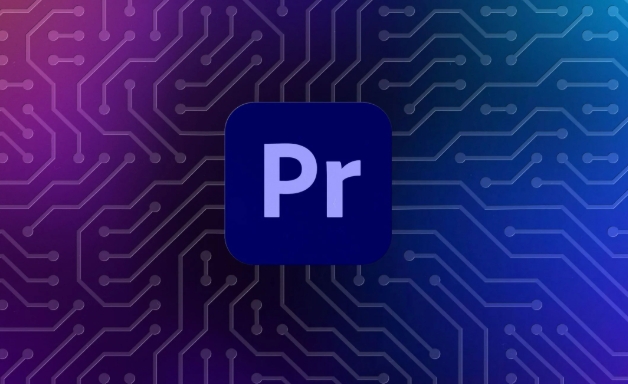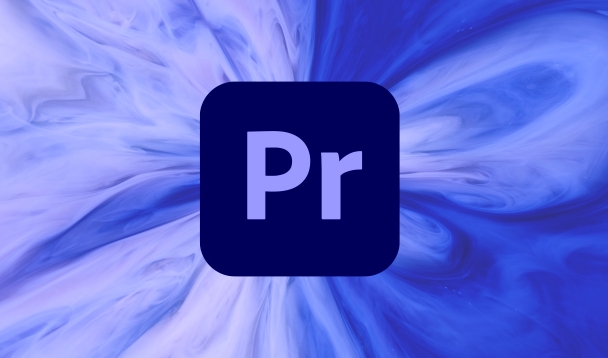In Premiere Pro, you can move text along the path in three ways: 1. Create static path text using the "Basic Graphics" panel; 2. Use mask paths to combine keyframes to create mobile animations; 3. Import After Effects synthesis to achieve complex control. First, open the Basic Graphics panel to create text and use the Shape tool to draw the path. Paste the text on the path to achieve static arrangement; second, draw the path and copy the track through the Pen tool, paste it on the "Position" keyframe of the text layer to achieve the moving effect; finally, use After Effects to create the path animation and export the dynamic link file, and retain the complete animation information in Premiere. Notes include using smooth curves, adjusting font size or path scaling, controlling animation speed, and enhancing text and background contrast for visibility.

Letting the text move along the path in Premiere Pro is actually a very practical effect, especially suitable for creating dynamic titles, opening animations, etc. Although it does not support path text natively like After Effects, similar effects can be achieved through some tricks.

1. Create path text using the Basic Graphics panel
The Basic Graphics panel has been added to the recent version of Premiere Pro, which allows you to arrange text along paths:

- Open the Basic Graphics panel (Window > Basic Graphics)
- Select Text in New Graphic
- Then use the Shape Tool to draw a curve or path
- After selecting the text box, place the cursor on the path, click it to paste the text on the path
This method is suitable for static path text display, such as lying around a circular text arrangement. But if you want the text to move along the path , you also need to combine the keyframe animation.
2. Use mask path to make text moving animations
If you want the text itself to move along a path instead of just being arranged on the path, you can use the "mask path" to simulate this effect:

- Create a solid color layer as background
- Use the Pen Tool on this layer to draw the path you want (such as S-shaped, circles, etc.)
- Copy the motion track of this path
- Select your text layer and find the Position property in the Effect Control
- Paste the copied path to the "Position" keyframe
This way the text will move along the path you have drawn before. Note: This requires you to have a certain understanding of keyframes and path operations, but it will be very flexible once you master it.
3. Import After Effects synthesis for more complex control
If you have After Effects, it's easier. Premiere supports direct import of AE compositions and retains all animation information:
- Create path text animation in AE
- Export the entire composition into a "dynamic link" file
- Import this dynamic link file in Premiere
- You can see the complete path text animation effect when playing
Although this method has one more software step, it can achieve the most refined control and is especially suitable for professional projects or complex dynamic layout needs.
4. Precautions and tips
- Try to use smooth curves as much as possible to avoid too many corners, otherwise the text will jump
- If the text is too long, the path is not enough, you can adjust the font size or zoom the path appropriately
- Don't be too fast, especially when the path is complicated, the audience needs time to read
- The contrast between the text color and background is obvious, otherwise it will be difficult to see clearly
Basically these are the methods. Although Premiere Pro is not as direct as AE, it can also produce good results through the combination of "basic graphics" and "mask path". As long as you master the basic logic of paths and keyframes, it is not difficult to implement.
The above is the detailed content of how to make text follow a path in Premiere Pro. For more information, please follow other related articles on the PHP Chinese website!

Hot AI Tools

Undress AI Tool
Undress images for free

Undresser.AI Undress
AI-powered app for creating realistic nude photos

AI Clothes Remover
Online AI tool for removing clothes from photos.

Clothoff.io
AI clothes remover

Video Face Swap
Swap faces in any video effortlessly with our completely free AI face swap tool!

Hot Article

Hot Tools

Notepad++7.3.1
Easy-to-use and free code editor

SublimeText3 Chinese version
Chinese version, very easy to use

Zend Studio 13.0.1
Powerful PHP integrated development environment

Dreamweaver CS6
Visual web development tools

SublimeText3 Mac version
God-level code editing software (SublimeText3)
 how to make text appear one letter at a time in Premiere Pro
Jul 08, 2025 am 12:02 AM
how to make text appear one letter at a time in Premiere Pro
Jul 08, 2025 am 12:02 AM
To display text letter by letter, use PremierePro’s built-in “Typewriter” animation preset or manually adjust the opacity or zoom of each character. 1. Use presets such as "Typewriter-Reveal" in the "EssentialGraphics" panel to directly apply the verbatim effect; 2. Enable character-by-character animation through the "EssentialGraphics panel" and select Opacity or Scale for customization; 3. Set Start and EndOffset to control the animation rhythm and combine keyframes to achieve dynamic changes; 4. You can adjust the offset, add blur or color change to enhance the effect. It is recommended that each letter lasts 0.1-0.2 seconds and is suitable for phrases rather than long paragraphs.
 how to fix red frames in Premiere Pro
Jul 07, 2025 am 12:16 AM
how to fix red frames in Premiere Pro
Jul 07, 2025 am 12:16 AM
The red box appears in PremierePro because the preview file is not generated or the material path is incorrect. Common reasons include just imported projects, material path changes, insufficient cache space, or failed proxy files loading. Solution: 1. Wait for automatic cache generation; 2. Manually generate preview rendering timeline; 3. Check and relink missing materials; 4. Clean and rebuild media cache. When using proxy clips, you should confirm that the proxy files are correctly associated and appropriately reduce the playback resolution to improve preview fluency.
 how to create a cinematic look in Premiere Pro
Jul 06, 2025 am 12:07 AM
how to create a cinematic look in Premiere Pro
Jul 06, 2025 am 12:07 AM
To bring up a movie-like picture in PremierePro, the key is to adjust the basics and follow the following steps: 1. Use the LumetriColor panel for basic corrections and creative color grading to avoid directly applying presets; 2. Add FilmGrain effect to improve texture but not excessively; 3. Control the details of highlights and shadows, and combine local adjustments to enhance levels; 4. Set appropriate output parameters such as H.264 or ProRes, 10bit color depth to preserve the color grading effect.
 how to make a video look like old film in Premiere Pro
Jul 11, 2025 am 12:04 AM
how to make a video look like old film in Premiere Pro
Jul 11, 2025 am 12:04 AM
If you want the video to present the old movie effect in PremierePro, the core is to adjust color, add noise, simulate film scratches and adjust the frame rate appropriately. 1. Adjust the color style: Use the LumetriColor panel to reduce saturation, increase warm tones, or apply "antique" presets and fine-tune according to the picture; 2. Add particles and scratches: Add appropriate amount of particles through plug-ins or built-in effects, superimpose transparent scratch layers and select the appropriate blending mode; 3. Adjust frame rate and playback speed: Export high frame rate materials to lower frame rates or use frame fusion to simulate the playback rhythm of old movies; 4. Add black edges and slight jitter: Use a mask layer to add black edges, and retain slight shaking through WarpStabilizerVFX to enhance the sense of reality. Each step requires
 how to use the Essential Sound panel in Premiere Pro
Jul 08, 2025 am 12:27 AM
how to use the Essential Sound panel in Premiere Pro
Jul 08, 2025 am 12:27 AM
TousetheEssentialSoundpanelinPremiereProeffectively,startbyselectingthecorrectaudiotype—Dialogue,Music,SoundEffects,orAmbience—asthisenablesautomaticprocessingtailoredtoeachtype.Next,applyLoudnessControltostandardizevolumelevelsacrossclips,usingAuto-
 how to add a watermark in Premiere Pro
Jul 09, 2025 am 12:40 AM
how to add a watermark in Premiere Pro
Jul 09, 2025 am 12:40 AM
The key to adding watermarks in PremierePro is position selection and parameter settings to ensure that the subject screen does not affect the clear logo. A common practice is to place the watermark in the lower right corner or the upper left corner to avoid the face or important content areas; it is recommended to choose a fixed position on the edge of the dynamic picture. The watermark size is generally controlled within 10% of the screen width. There are two main ways to add: 1. Import the image as a layer and adjust the position, size and transparency (PNG format is recommended); 2. Use the built-in watermark function in the export settings (applicable to later versions of 2022). Pay attention to details including using high-definition pictures, avoiding occlusion of important information, considering background light and dark contrast, and whether the export format supports Alpha channel, such as MOV format. The whole process is clear and suitable for beginners
 how to add an end credits roll in Premiere Pro
Jul 06, 2025 am 12:07 AM
how to add an end credits roll in Premiere Pro
Jul 06, 2025 am 12:07 AM
How to add end credit scrolling subtitles in Adobe PremierePro? 1. Create a subtitle file: select "Scroll Subtitles" through "File" > "New Project" > "Subtitles" to generate a sequence and drag it into the timeline; 2. Edit content and layout: Enter text, select clear fonts, appropriate font sizes, set center alignment and appropriate colors and backgrounds to enhance readability; 3. Set scrolling speed and direction: Double-click the subtitle track to enter "Scroll Options", adjust the speed value and scrolling direction, and preview the effect; 4. Add a gradual/gradual effect: add a fade effect to the beginning and end of the subtitles in the "Transition" or "Animation" settings, and the time is controlled within 1 to 2 seconds. Follow the above steps to easily complete professional end-of-credit scrolling subtitles
 how to make the Premiere Pro interface bigger
Jul 13, 2025 am 12:24 AM
how to make the Premiere Pro interface bigger
Jul 13, 2025 am 12:24 AM
To enlarge the PremierePro interface elements, adjust the UI scaling, increase the text size, and customize the panel size. First, increase the UI scaling value in the preferences, then modify the font size in the theme appearance, and finally manually drag the edges of the panel to obtain a more extensive layout, thereby improving the operating experience under the high-resolution screen.






